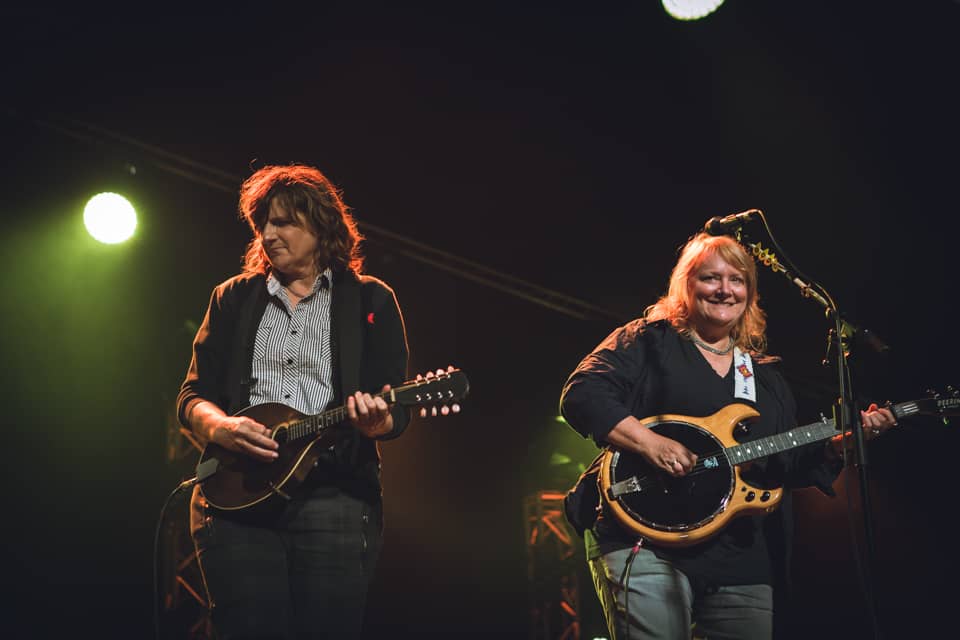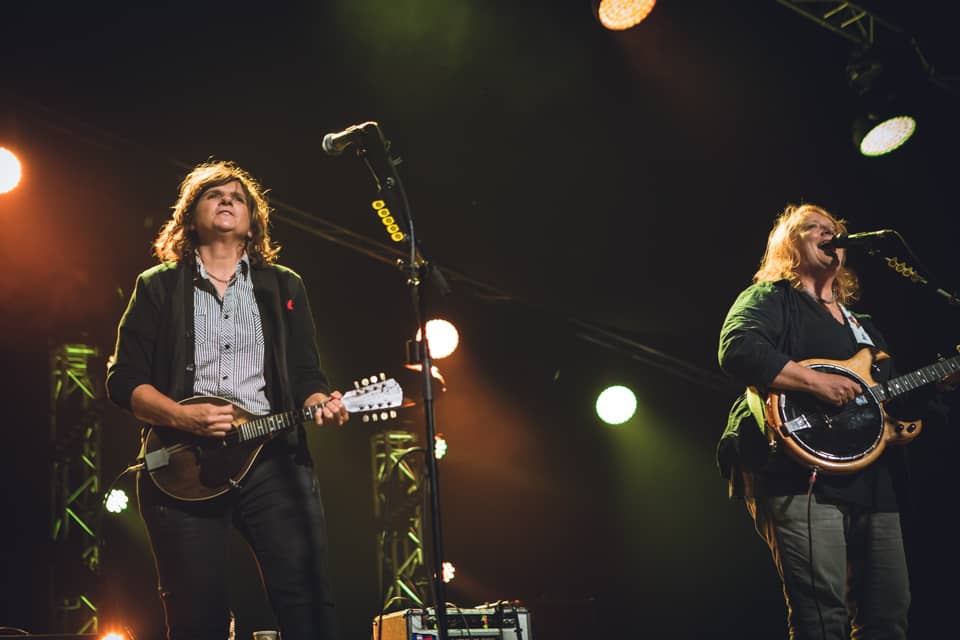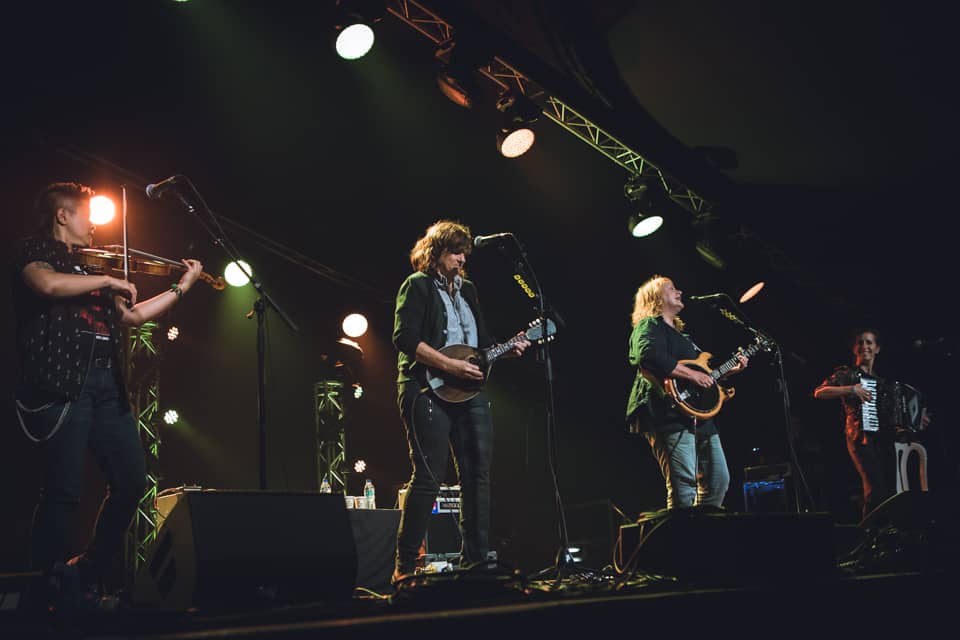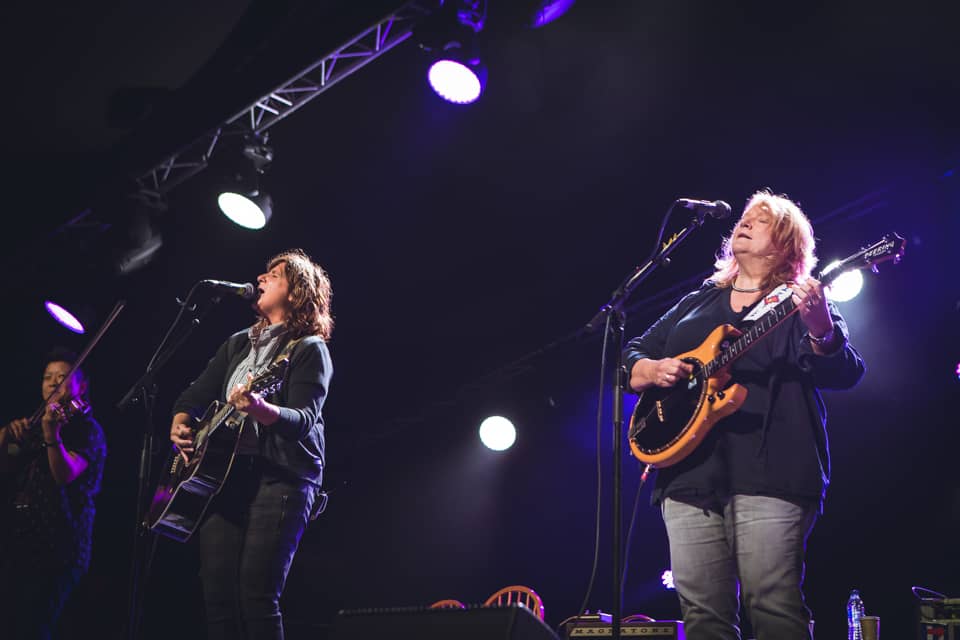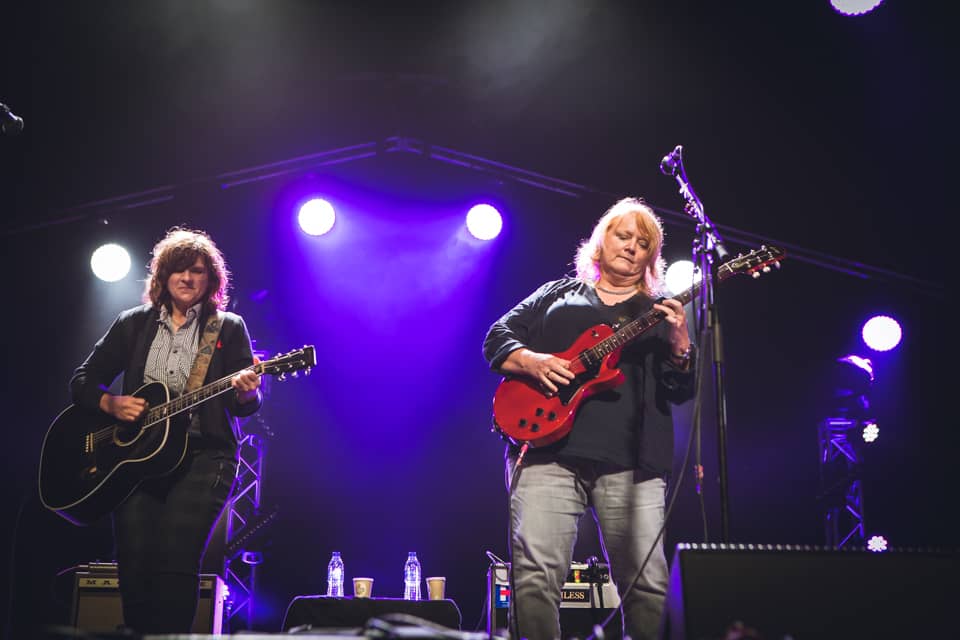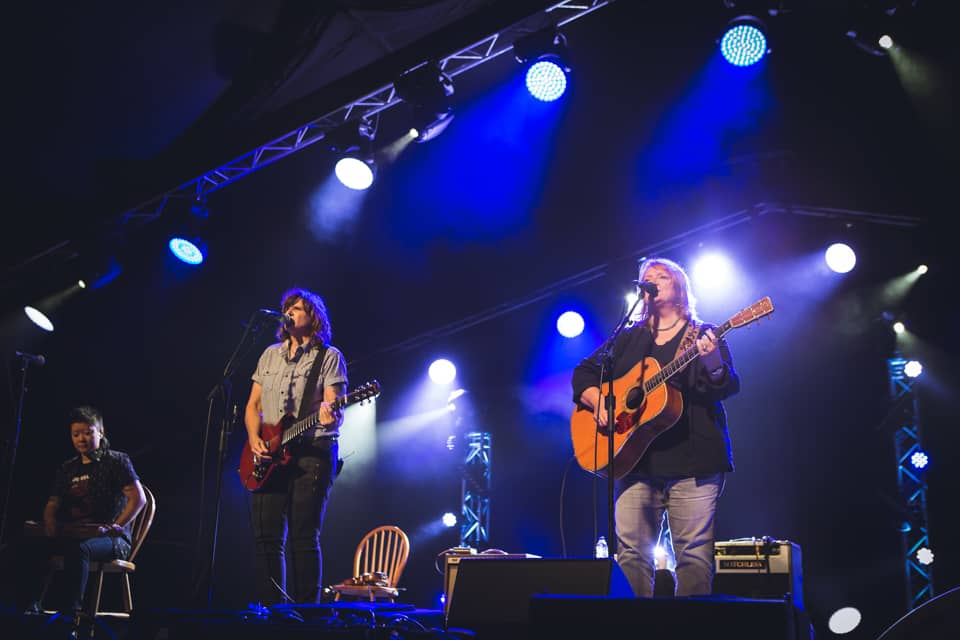It’s a few minutes before I’m due to meet Indigo Girls backstage at the Cambridge Folk Festival; the late afternoon sky has turned an ominous shade of grey, and the first signs of a typically British downpour are looming.
Our interview has been arranged to take place outside the festival press cabin. My prediction is that our conversation will be cut short or even postponed as, true to form, I notice the first drops of rain appear exactly at the point I’m being introduced to the Grammy Award-winning duo. As we sit down to talk, however, I don’t get any sense from my interviewees that they’re in a rush to disappear. They warmly greet me and minutes into our conversation when we’re chatting and laughing about parenthood; it’s easy to forget that I’m chatting with two artists who have been a force in the music industry for thirty years, twenty of them spent recording with major labels.
Despite the fact that Amy Ray and Emily Saliers have probably participated in more interviews over the years than they dare to remember, I’m struck by how engaged they are in our conversation. I start to realise that despite their loyal and extensive fan-base, Indigo Girls don’t take the interest and support they generate for granted;
“I just feel grateful all the time” Amy explains. “When we got to the festival today, we were showing our pass, and I was like ‘Yes I’m supposed to be here!’ because we’re always surprised that we still get to do what we do. It’s probably why people make fun of us; you could give us the same Christmas present every year, and we’d be surprised. That’s how we are.”
Our conversation turns to the process of writing. With fourteen studio albums under their belt including three Platinum sellers, I wonder if at any point Amy and Emily felt like they’d run out of things to say;
“I don’t really believe in writer’s block” Amy explains, “because I don’t want to believe in it. I think that there’s always something to say. A lot of times as a writer I get sick of my own perspective, but then as an exercise, I try to write from someone else’s perspective. I think writing is a muscle and you have to exercise it. If you get worried about writer’s block it just snowballs. A lot of books I’ve read about writing, especially one that Stephen King wrote, really talk about the idea of it being a discipline and just looking at it that way instead of being so precious about it all the time. That helps you not be so self-reverent about ‘do I have anything to say?’ That’s not the point…whether you can write a song is the point.”
“I just feel like life continually is stirring” Emily agrees, “especially with what’s going on the States right now politically. It’s not like things like that haven’t happened historically, but when you’re living in it…I find myself trying to understand things. When I try to understand things, I’m apt to want to write about them. Not all the things we write about are social or political issues, and now we’re parents of young children that opens your eyes in a different way. There’s always something happening and I’ve always found writing just as a way to help me process the world around me, so unless I stop wanting to do that there’s probably no end to writing.”
Emily’s mention of politics prompts me to ask about the intersect between art and personal convictions. Politically active, over the years Amy and Emily have championed and held benefit concerts for many causes including the environment, gay rights and the rights of Native Americans;
“It’s not like we write a lot about issues” Amy responds, “it’s just that we’re part of society and engaged in it. Even when we were young…just starting out on the club scene…we would do benefits for soup kitchens and delivery services for people with AIDS, things like that, just because we were taught that whatever your gift is or whatever your job is, you try to use that to better your community. It’s not like ‘we’re musicians, and we want you to hear what we say’, it’s just part of our lives. We could be accountants and we’d be doing this. It’s just part of the way we live, we try to use our career. We have a lot of resources because of our career, like connections with people. When we were on Sony we would do things like sending video cameras to the Zapatistas to document things…we just used whatever angle we had.”
Any artist with a career spanning over thirty years will have seen tremendous change within the industry; “For me, the thing that’s changed the most is both positive and negative” Amy reflects. “Digital technology and the internet have made DIY so great, so easy and inexpensive to record records. The distribution process is so accessible to people. It’s amazing, but it’s a tool that we have to figure out how to use the right way too. For older school musicians like us, we have to figure out these new ways of approaching things, but I think ultimately it’s very freeing.”
“There are so many advantages for being independent and really revolutionary if you want to be” she continues. “We’ve seen the shift from independent radio in the states, a lot of independent media, college driven media…alternative and punk rock kind of stuff…through corporate mergers, dropping of regulation so that all these companies can merge. And then to this next level of the internet breaking things wide open. Who knows where it’s going…”
I notice Emily listening intently; “I agree with Amy,” she says. “It was nice to be around when major labels were still nurturing the life of bands. We were an oddball band; there was no bidding war to sign Amy and me. We landed with this major, major label that nurtured us along the course of seven or eight albums.”
Amy nods in agreement; “We were mates with Pearl Jam, Rage Against The Machine, Oasis, Joan Jett…bands that they totally developed.”
“And then us” Emily continues. “The record company had enough respect for us not to try and mess with what it was that we did and I appreciated that. It happens less now.”
The catalogue of material Amy and Emily built with Epic Records provided the platform for years of touring. It’s evident that performing is something they never grow tired of;
“I love playing live with Amy” Emily smiles. “I was sitting in my dressing room just now thinking we are so fortunate to come to this festival, all these years later to still have a career. It blew my mind, and that happens to me a lot. All these years and we’re still really excited about it and really grateful for it. Our fans are amazing; an incredibly loyal, interesting and vibrant following.”
Modesty about success is something Indigo girls have learned over time; “When you’re so young, and you start out, you have this heady moment” Amy explains, “You meet all these famous people and you think you’re the centre of the universe. You have to learn that the world is big, there’s a lot of other kinds of music out there. As Americans particularly, you have to learn that. Being a musician in America is like a double-whammy because you think America is the centre of the universe and you also think that you are, so you have to learn a lot of shit you know? For me it’s been humbling.”
We talk about future plans. Following more Indigo Girls touring the Autumn, Amy is planning to take time off while Emily will be touring her first solo album (released in August 2017). The Indigo Girls then have a symphony record coming out in January of 2018 and they’ll be touring that record across North America. Amy has plans for her seventh solo record and, after that, the duo will work on a new Indigo Girls album; a follow-on to their acclaimed 2015 release ‘One Lost Day.’ I also learn that the next Indigo Girls album might be recorded in the UK;
“We made a record here before with John Reynolds, the producer who worked with Damien Dempsey and Sinéad O’Connor” Amy explains. “We loved the record we made with him, he’s a dear friend. We saw him the other night and we were just like ‘our goal is to write enough songs to get back over here and make that record with you!’”
Our conversation draws to an end and I leave the Indigo Girls to head back to their dressing room. Before they leave, they thank me and tell me how much they’re looking forward to that night’s performance. I genuinely believe them.
Later that evening I watch Amy and Emily on stage, noticing in particular their relaxed professionalism; they clearly belong on that stage. I think back to something Emily said earlier in the day;
“Music empowers us and propels us really. I can’t imagine not doing it.”


